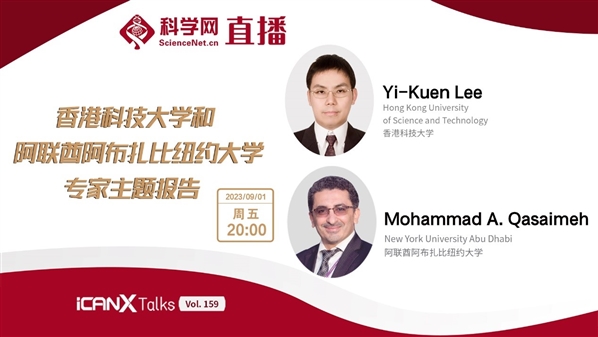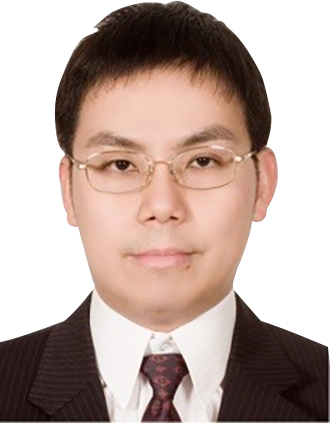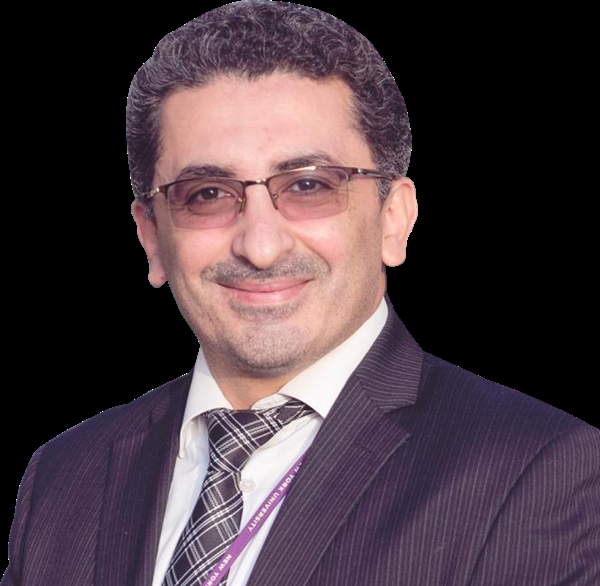
直播时间:2023年9月1日(周五)20:00-21:30
直播平台:

科学网APP
https://weibo.com/l/wblive/p/show/1022:2321324941119304892727
(科学网微博直播间链接)

科学网微博

科学网视频号
北京时间2023年9月1日晚八点,iCANX Talks 第159期邀请到香港科技大学的Yi-Kuen Lee讲述利用pMEF 和 DLM 的深度技术融合提供癌症精准诊断及个体化用药;阿联酋阿布扎比纽约大学的Mohammad A. Qasaimeh讲述在开发下一代扫描探针方面所做的努力。更多精彩,敬请期待!
【嘉宾介绍】

Yi-Kuen Lee
Hong Kong University of Science and Technology
Revolutionizing Cancer Diagnosis: Synergizing pMEF Chip Technology with Deep Learning Models
【Abstract】
Circulating Tumor Cells (CTCs) are pivotal markers for metastasis, playing a significant role in cancer progression. Despite the surge in microfluidic and nanotechnologies aimed at isolating and detecting CTCs, their integration into routine clinical practice remains challenging. This is attributed to the heterogeneity of CTCs across patients, their low prevalence in blood, and the need for robust and clinically dependable detection systems. To surmount these obstacles, we introduced the groundbreaking personalized Microfluidic Elasto-Filtration (pMEF) chip technology, leading to the development of the holistic pMEF system. This innovative approach harnesses the interplay between blood fluid mechanics and hyperelasticity principles. By optimizing the Capillary number-based MEF technology, it anticipates the unique deformations of CTCs. Furthermore, it incorporates biophysical data from patient samples to determine individualized MEF parameters. Collaborations with multiple hospitals have confirmed the systems exceptional clinical sensitivity and specificity across a spectrum of over ten cancer types. To further enhance the clinical efficacy of the pMEF system, we are integrating deep learning models (DLM). These models delve into novel CTC biomarkers within the vast dimensional space of DLM and explore potential label-free DLM techniques. This integration facilitates the meticulous analysis of extensive clinical datasets, ushering in a more nuanced and accurate cancer diagnosis. Our initial clinical trials, which capitalize on the combined prowess of pMEF technology and DLM, are set to meet the rigorous standards established by FDA guidelines. As we continue to incorporate more clinical data, the combined force of pMEF and DLM stands at the cusp of transforming clinical cancer diagnosis, laying the groundwork for bespoke treatments in the near future.
循环肿瘤细胞(CTC)是肿瘤转移的关键标志物,在癌症进展中发挥着重要作用。目前有各种检测 CTCs 的微流控技术和纳米技术,但将其纳入常规临床实践仍具有挑战性。因为不同癌症患者 CTC 具有异质性,在血液中浓度非常低,而且需要临床可靠的检测系统。为了克服这些障碍,我们推出了开创性的国际领先个性化微流控弹性过滤(pMEF)芯片技术,从而开发出了pMEF 系统。pMEF芯片利用了血液流体力学和超弹性力学,通过优化基于毛细管数量的 MEF 技术,结合患者样本的生物物理数据,确定个性化的 MEF 参数。与多家三甲医院的临床研究证实,该系统在十多种癌症类型中具有卓越的临床灵敏度和特异性。为了进一步提高 pMEF 系统的临床疗效,我们整合深度学习模型 (DLM)。在DLM 的超高维度空间,深入研究各种新型 CTC 生物标记物,并探索潜在的无标记 DLM 技术,将有助于对广泛的临床数据集进行细致分析,从而带来更细致、更准确的癌症诊断。利用 pMEF 技术和 DLM 的综合优势,我们的初步临床试验,可以对于未来大规模多中心临床实验奠定基础。随着我们不断吸收更多的临床数据,pMEF 和 DLM 的深度技术融合可以提供癌症精准诊断及个体化用药奠定基础。
【BIOGRAPHY】
Prof. Yi-Kuen Lee received his BS & MS degrees from Taiwan University, a Ph.D. degree in MEMS at UCLA in 2001. He has been a tenured professor in Mechanical & Aerospace Engineering and Biomedical Engineering at HKUST and the executive committee of Hong Kong ITF funded international reseach center (HKCRC). He was Visiting Associate at Caltech in 2010-2011. His current research topics include CMOS MEMS sensors and microfluidics for smart buildings, smart manufacturing and global health. He was the President of Hong Kong Society of Theoretical and Applied Mechanics (HKSTAM) in 2012–2014. He was the co-founder of IEEE NEMS Conference; TPC of IEEE MEMS 2007; TPC of APCOT 2012-2014, TPC of IEEE NEMS 2013, Transducers 2013, 2015, co-chair of ICMAN 2011. He has published over 200 international journal and conference papers. He was the Associate Editor of Microfluidics and Nanofluidics (Springer-Nature). He is on the editorial board of Micronanoelectronic Technology and Bio-Design and Manufacturing (Springer-Nature). He co-chaired Asia-Pacific Conference of Transducers and Micro-Nano Technology (APCOT 2018), Hong Kong in 2018. He is also the Executive Technical Program Committee of 2023 Transducers, Kyoto, Japan, June 2023.
李贻昆教授在台湾大学获得学士和硕士学位,于 2001 年在加州大学洛杉矶分校获得微机电系统博士学位。他是香港科技大学机械与航空航天工程和生物医学工程的终身教授,也是香港创新及科技基金资助的国际研究中心(HKCRC)的执行委员。2010~ 2011 年,他在加州理工学院担任访问学者。他目前的研究课题包括用于智能建筑、智能制造和全球健康的 CMOS MEMS 传感器和微流控芯片。他于 2012-2014 年担任香港理论及应用力学学会(HKSTAM)会长。他是 IEEE NEMS 会议的共同创办人;2007 年 IEEE MEMS TPC;2012-2014 年 APCOT TPC;2013 年 IEEE NEMS TPC;2013 年和 2015 年 Transducers;2011 年 ICMAN 联合主席。他发表了 200 多篇国际期刊和会议论文,是《Microfluidics and Nanofluidics》(Springer-Nature)的副主编。他是 Micronanoelectronic Technology 和 Bio-Design and Manufacturing (Springer-Nature) 编辑委员会成员,共同主持了2018年在香港举行的亚太传感器与微纳技术会议(APCOT 2018)。他也是日本京都2023 Transducers的执行技术项目委员会成员。

Mohammad A. Qasaimeh
New York University Abu Dhabi
Multiphysics Microfluidic Probes for Cell Manipulation and Analysis
【Abstract】
This talk will focus on discussing our efforts in developing next generation scanning probes, with applications ranging from cell manipulation, capture, and analysis, to advanced atomic force microscopy imaging and biosensing. The first half of the talk will be focused on the concept of the Multiphysics Probes; multifunctional integrated tools developed based on the microfluidic probe technology, with applications on “on-the-fly” cell separation and patterning, multiplex capture of clinical circulating tumor cells, and single-cell biopsy sampling and analysis. The second half of the talk will be geared towards presenting our developed technology of 3DTIPs, which are envisioned as the next-generation 3D probes for atomic force microscopy. 3DTIPs are soft polymeric probes with novel three-dimensional shapes and structures, and shown to be effective in obtaining high-resolution and high-speed images in air and liquid environments. By the end of this talk, I will further discuss our current attempts in merging the Multiphysics Probes and 3DTIPs technologies into a single tool named FluidTIPs, which aimed for advanced multiparametric single-cell manipulation and analysis.
本讲座将重点讨论我们在开发下一代扫描探针方面所做的努力,其应用范围包括细胞操作、捕获和分析,以及先进的原子力显微镜成像和生物传感。讲座的前半部分将重点介绍多物理探针的概念;基于微流体探针技术开发的多功能集成工具,可应用于 "即时 "细胞分离和图案化、临床循环肿瘤细胞的多重捕获以及单细胞活检取样和分析。讲座的后半部分将介绍我们开发的 3DTIPs 技术,该技术被视为原子力显微镜的下一代 3D 探针。3DTIPs 是具有新颖三维形状和结构的软聚合物探针,在空气和液体环境中可有效获取高分辨率和高速图像。在本讲座的最后,我将进一步讨论我们目前将多物理探针和三维TIPs技术合并成一个名为FluidTIPs的工具的尝试,该工具旨在实现先进的多参数单细胞操作和分析。
【BIOGRAPHY】
Dr. Qasaimeh is an Associate Professor of Mechanical Engineering and Bioengineering at New York University Abu Dhabi (NYUAD), Abu Dhabi, UAE. He established the Advanced Microfluidics and Microdevices Laboratory (AMMLab) in 2014, and his current research interests include developing microfluidic and MEMS devices for point-of-care diagnostics. Recently, Dr. Qasaimeh was awarded the Distinguished Service Award from NYUAD and the Technology Innovation Pioneers (TIP) Award from the UAE’s Ministry of Economy during the TIP 2020 Summit. Prior to joining NYUAD, he was a Postdoctoral Research Associate at Massachusetts Institute of Technology and a Research Fellow at Harvard Medical School. Dr. Qasaimeh completed his PhD degree in Biomedical Engineering from McGill University, where he received several prestigious fellowships and awards including the NSERC Postdoctoral Fellowship and the Alexander Graham Bell Graduate Scholarship. Dr. Qasaimeh’s research has been published in many peer-reviewed journals including Nature Communications, Small, Advanced Science, Advanced Materials Technologies, and Lab on a Chip, and he delivered more than 45 keynote and invited lectures at national and international conferences. Dr. Qasaimeh is actively involved in organizing several local and international conferences, and currently serving as a General Chair for the 6th International Conference on Manipulation, Automation and Robotics at Small Scales (MARSS). Dr. Qasaimeh is serving as an Associate Editor with the journal Frontiers in Robotics and AI (Nano- and Microrobotics), a Topic Editor with the journal Biosensors, a Review Editor with the journal Frontiers in Bioengineering and Biotechnology, and an Editorial Board Member of Scientific Reports at the Nature Publishing Group.
Qasaimeh 博士是阿联酋阿布扎比纽约大学(NYUAD)机械工程和生物工程副教授。他于2014年成立了先进微流控与微器件实验室(AMLab),目前的研究兴趣包括开发用于床旁诊断的微流控与微机电系统(MEMS)器件。最近,Qasaimeh 博士在 TIP 2020 峰会期间获得了纽约大学颁发的杰出服务奖和阿联酋经济部颁发的技术创新先锋奖(TIP)。在加入纽约农工大学之前,他曾在麻省理工学院担任博士后研究员,并在哈佛大学医学院担任研究员。Qasaimeh博士在麦吉尔大学完成了生物医学工程博士学位,并获得了多项著名的奖学金和奖项,包括国家科学研究中心博士后奖学金和亚历山大-格雷厄姆-贝尔研究生奖学金。Qasaimeh 博士的研究成果发表在许多同行评审期刊上,包括《Nature Communications》、《Small》、《Advanced Science》、《Advanced Materials Technologies》和《Lab on a Chip》。Qasaimeh 博士积极参与组织多个本地和国际会议,目前担任第六届小尺度操纵、自动化和机器人国际会议 (MARSS) 的总主席。他是《机器人与人工智能前沿》(纳米与微机器人)杂志的副主编、《生物传感器》杂志的专题编辑、《生物工程与生物技术前沿》杂志的评论编辑,以及自然出版集团《科学报告》的编委。
特别声明:本文转载仅仅是出于传播信息的需要,并不意味着代表本网站观点或证实其内容的真实性;如其他媒体、网站或个人从本网站转载使用,须保留本网站注明的“来源”,并自负版权等法律责任;作者如果不希望被转载或者联系转载稿费等事宜,请与我们接洽。